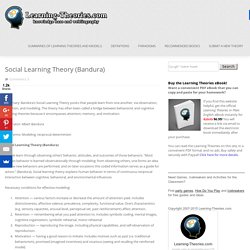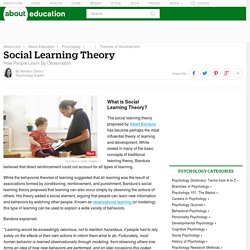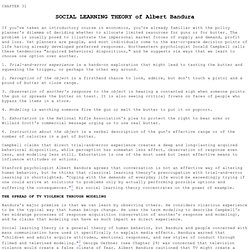

Social Learning Theory. Social Learning Theory definition. Social learning (psychology) Bandura1969HSTR.pdf. Albert Bandura. Bandura and Social Learning Theory. Social Learning Theory (Bandura) Summary: Bandura’s Social Learning Theory posits that people learn from one another, via observation, imitation, and modeling.

The theory has often been called a bridge between behaviorist and cognitive learning theories because it encompasses attention, memory, and motivation. Originator: Albert Bandura Key Terms: Modeling, reciprocal determinism Social Learning Theory (Bandura) People learn through observing others’ behavior, attitudes, and outcomes of those behaviors. Necessary conditions for effective modeling: Attention — various factors increase or decrease the amount of attention paid. Bandura believed in “reciprocal determinism”, that is, the world and a person’s behavior cause each other, while behaviorism essentially states that one’s environment causes one’s behavior, Bandura, who was studying adolescent aggression, found this too simplistic, and so in addition he suggested that behavior causes environment as well.
For more information, see: Bandura, A. (1997). Social Learning Theory: Understanding Bandura's Theory of Learning. What is Social Learning Theory?

The social learning theory proposed by Albert Bandura has become perhaps the most influential theory of learning and development. While rooted in many of the basic concepts of traditional learning theory, Bandura believed that direct reinforcement could not account for all types of learning. While the behavioral theories of learning suggested that all learning was the result of associations formed by conditioning, reinforcement, and punishment, Bandura's social learning theory proposed that learning can also occur simply by observing the actions of others. His theory added a social element, arguing that people can learn new information and behaviors by watching other people. Known as observational learning (or modeling), this type of learning can be used to explain a wide variety of behaviors. Bandura explained: Basic Social Learning Concepts There are three core concepts at the heart of social learning theory. 1.
Bandura_SocialLearningTheory_ger.pdf. SOCIAL LEARNING THEORY of Albert Bandura, Chapter 31. If you've taken an introductory course in economics, you're already familiar with the policy planner's dilemma of deciding whether to allocate limited resources for guns or for butter.

The problem is usually posed to illustrate the impersonal market forces of supply and demand, profit and loss. Yet planners are people, and most individuals come to the war-or-peace decision points of life having already developed preferred responses. Northwestern psychologist Donald Campbell calls these tendencies "acquired behavioral dispositions," and he suggests six ways that we learn to choose one option over another. 1. Trial-and-error experience is a hands-on exploration that might lead to tasting the butter and squeezing the trigger, or perhaps the other way around. 2. 3. 4. 5. 6. Bandura's major premise is that we can learn by observing others. Bandura's warning struck a responsive chord in parents and educators who feared that escalating violence on TV would transform children into bullies.
Social Learning Theory. Social Learning Theory. Custom Search Oops, That Pages Doesn't Exist But don't worry, we've got you covered.

If you have typed the address, make sure the spelling is correct. Most addresses are case sensitive. If you clicked on a link, it may be faulty or out of date. You can always start back at the Home page as well. Search Popular Pages Home Navigation © simplypsychology.org.